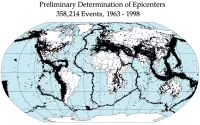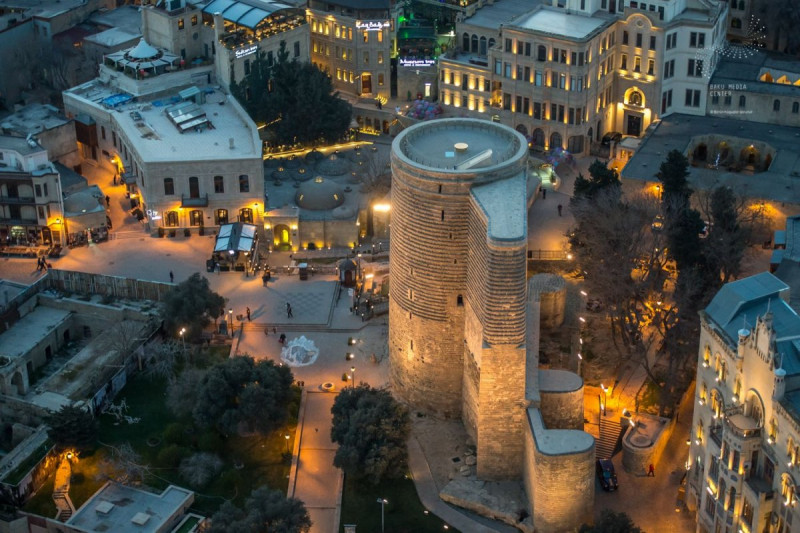Baku is the capital and largest city of Azerbaijan, situated on the Caspian Sea's southern shore on the Absheron Peninsula. It is the largest city on the Caspian Sea and in the Caucasus region. Notable for being 28 meters below sea level, it holds the distinction of being the lowest-lying national capital globally. With an urban population estimated at two million as of 2009, Baku serves as Azerbaijan's primate city, housing approximately 25% of the nation's population within its metropolitan area.
1900: Baku had more than 3,000 oil wells
By 1900, Baku had more than 3,000 oil wells, with 2,000 producing oil at industrial levels.
1902: Founding of Baku Port
Baku Port was founded in 1902 and claims to be the largest Caspian Sea port.
1913: Baku the largest city in the Caucasus region
By 1913, Baku became the largest city in the Caucasus region, with a population of 215,000.
1917: Baku came under the control of the Baku Commune
In 1917, after the October Revolution, Baku came under the control of the Baku Commune, led by Stepan Shahumyan.
May 1918: Azerbaijan Democratic Republic proclaimed independence
On May 28, 1918, the Azerbaijani faction of the Transcaucasian Sejm proclaimed the independence of the Azerbaijan Democratic Republic (ADR) in Ganja.
September 1918: Azerbaijani troops conducted days of pillaging and killing Armenians of Baku
After the Battle of Baku in August-September 1918, Azerbaijani troops conducted days of pillaging and killing Armenians of Baku. This became known as the "September Days".
September 1918: Azerbaijani forces captured Baku
On September 15, 1918, Azerbaijani forces, with support from the Ottoman Army of Islam, captured Baku.
1919: British forces left Baku
British forces left Baku before the end of 1919.
April 1920: 11th Red Army invaded Baku and reinstalled the Bolsheviks
On April 28, 1920, the 11th Red Army invaded Baku and reinstalled the Bolsheviks, making Baku the capital of the Azerbaijan Soviet Socialist Republic within Soviet Russia.
1921: City headed by the Baku City Executive Committee
From about 1921 the city was headed by the Baku City Executive Committee, commonly known in Russian as Bakgorispolkom.
1922: Baku became the venue for one of the major trade fairs of the Soviet Union
From 1922 to 1930 Baku became the venue for one of the major trade fairs of the Soviet Union, serving as a commercial bridgehead to Iran and the Middle East.
1930: Baku served as a venue for one of the major trade fairs of the Soviet Union
From 1922 to 1930 Baku became the venue for one of the major trade fairs of the Soviet Union, serving as a commercial bridgehead to Iran and the Middle East.
1939: Start of World War II
In 1939, World War II began, highlighting Baku's growing importance as a major energy hub.
November 1942: Wehrmacht reached a point near Baku
In November 1942, during World War II, the Nazi German Wehrmacht reached a point approximately 530 kilometers northwest of Baku.
December 1942: Soviet Operation Little Saturn drove back Wehrmacht
In mid-December 1942, the Soviet Operation Little Saturn drove back the German Wehrmacht after they had neared Baku.
1945: End of World War II
World War II ended in 1945, a period during which Baku was a strategic location.
November 1967: Opening of Baku Metro
The Baku Metro was opened in November 1967 and includes 3 lines and 25 stations at present.
November 1983: Absheron Museum of History and Local Studies Started Its Activities
The Absheron Museum of History and Local Studies started its activities on November 21, 1983.
1988: Baku had very large Russian, Armenian, and Jewish populations
Until 1988, Baku had very large Russian, Armenian, and Jewish populations which contributed to cultural diversity and added in various ways to Baku's history.
January 1990: Pogrom against Armenians
With the onset of the First Nagorno-Karabakh War and the pogrom against Armenians starting in January 1990, the city's large Armenian population was expelled.
1991: Baku embarked on a process of restructuring after the dissolution of the Soviet Union
After the 1991 dissolution of the Soviet Union, Baku initiated a major restructuring, demolishing Soviet-era buildings and creating green spaces.
1991: Azerbaijani spelling uses the Latin alphabet since 1991
Since 1991, the modern Azerbaijani spelling has been using the Latin alphabet.
November 2000: Earthquake Damages Inner City
In November 2000, an earthquake caused damage to the Inner City of Baku.
2000: Old City designated as UNESCO World Heritage Site
In 2000, the Old City of Baku, which includes the Palace of the Shirvanshahs and the Maiden Tower, was designated as a UNESCO World Heritage Site.
2002: Baku starts hosting major sporting events
Since 2002, Baku has hosted 36 major sporting events.
2003: Baku had internally displaced persons and refugees
In 2003, Baku had 153,400 internally displaced persons and 93,400 refugees.
2003: Restoration and modernization of Teze Bey
In 2003, Teze Bey, the most popular hamam in Baku, was fully restored and modernised, featuring a swimming pool and architectural details inspired by Oriental, Russian and Finnish baths.
2003: Inner City Placed on List of World Heritage in Danger
In 2003, UNESCO placed the Inner City of Baku on the List of World Heritage in Danger, citing damage from a November 2000 earthquake, poor conservation, and dubious restoration efforts.
March 2005: Opening of the new Baku Cargo Terminal
In March 2005, the new Baku Cargo Terminal was officially opened at Heydar Aliyev International Airport.
2005: Sporting Events in Baku
In 2005, Baku hosted the World Rhythmic Gymnastics Championships.
2005: Development of Azerbaijani jazz
The year 2005 was a landmark in the development of Azerbaijani jazz in Baku, which has been home to legendary jazz musicians.
2007: Sporting Events in Baku
In 2007 Baku hosted the Rhythmic Gymnastics European Championships and the European Taekwondo Championships.
2007: Opening of Heydar Aliyev Cultural Centre
In 2007, the Heydar Aliyev Cultural Centre, designed by Zaha Hadid, was opened in Baku.
2007: Construction of Kars–Tbilisi–Baku railway
In 2007, the construction of the Kars–Tbilisi–Baku railway, which directly connects Turkey, Georgia and Azerbaijan, began.
2007: South Caucasus Pipeline became operational
The South Caucasus Pipeline (SCP), also known as the Baku-Tbilisi-Erzurum Pipeline, became operational in 2007, transporting natural gas from Azerbaijan's Shah Deniz gas field to Turkey and further to Europe.
2008: Baku considered as one of the most polluted cities
As of 2008, Baku was considered one of the most polluted cities in the world.
2008: Plans to construct new Baku Metro stations
In 2008, the Chief of Baku Metro announced plans to construct 41 new stations over the next 17 years.
2009: Sporting Events in Baku
In 2009, Baku hosted the Rhythmic Gymnastics European Championships and the Women's Challenge Cup.
2009: Baku designated an Islamic Culture Capital
In 2009, Baku was designated as an Islamic Culture Capital, celebrating many of the city's cultural sites.
2009: Baku urban population estimated at two million
In 2009, Baku's urban population was estimated to be two million people.
2009: Inner City Removed from List of World Heritage in Danger
In 2009, the Inner City of Baku was removed from the UNESCO List of World Heritage in Danger.
September 2010: Inauguration of National Flag Square
In September 2010, Baku inaugurated the National Flag Square and set the world record for the tallest flagpole.
2010: Baku to host Eurovision Dance Contest 2010
Baku was chosen to host the Eurovision Dance Contest in 2010.
2010: Sporting Events in Baku
In 2010, Baku hosted the European Wrestling Championships.
2010: Reconstruction of Baku International Sea Trade Port
In 2010, the Baku International Sea Trade Port began to be reconstructed.
May 2011: Dushanbe sets a new record for tallest flagpole
In May 2011, the city of Dushanbe in Tajikistan set a new world record for the tallest flagpole, surpassing Baku's previous record with a flagpole 3 metres (9.8 feet) higher.
2011: Introduction of London cabs into Baku
As of 2011, 1,000 black cabs are ordered by Baku Taxi Company, and as part of a programme there is a plan to introduce London cabs into Baku. The move was part of £16 million agreement between Manganese Bronze subsidiary LTI Limited and Baku Taxi Company.
2011: Azerbaijan wins Eurovision Song Contest 2011
Following the victory of Azerbaijan's representative Eldar & Nigar at the Eurovision Song Contest in 2011, the profile of Baku's music scene has been boosted, prompting international attention.
2011: Sporting Events in Baku
In 2011, Baku hosted the World Amateur Boxing Championships and since 2011, the city annually hosts WTA tennis event called Baku Cup.
2011: Baku listed as 48th most expensive city
In 2011, Baku was listed as the 48th most expensive city in the world by Mercer Human Resource Consulting.
2012: Baku hosts the Eurovision Song Contest 2012
Following Azerbaijan's victory in 2011, Baku hosted the Eurovision Song Contest in 2012.
2014: Baku bidding to host 42nd Chess Olympiad
In 2014, Baku was bidding to host the 42nd Chess Olympiad.
2015: Baku hosts the European Games
Baku was selected to host the 2015 European Games.
2015: Renovation of Absheron Museum of History and Local Studies
In 2015, the Absheron Museum of History and Local Studies underwent a thorough renovation.
2015: Completion of Baku Olympic Stadium
The construction of Baku Olympic Stadium with 69,870 seating capacity was completed in 2015.
2016: First Formula One race in Baku
Baku hosted its first Formula One race, the 2016 European Grand Prix, on the Baku City Circuit.
2016: Baku hosted the European Grand Prix
In 2016, Baku hosted the European Grand Prix.
2016: Baku's bid for 2016 Summer Olympics
In 2016, Baku made a bid to host the Summer Olympics, but failed to become a Candidate City.
2016: Completion of Baku International Sea Trade Port reconstruction
The construction of the Baku International Sea Trade Port, which began in 2010, was planned to be completed by 2016.
2017: Baku hosts Islamic Solidarity Games
Baku hosted the fourth edition of the Islamic Solidarity Games in 2017.
2017: Opening of Kars–Tbilisi–Baku railway
In 2017, the Kars–Tbilisi–Baku railway, which directly connects Turkey, Georgia and Azerbaijan, was opened.
2018: Baku hosted the final of the 2018-19 UEFA Europa League
In 2018, Baku hosted the final of the 2018–19 UEFA Europa League.
2018: Number of visitors to the Absheron Museum of History and Local Studies
In 2018, the Absheron Museum of History and Local Studies was visited by 1,932 people.
May 2019: UEFA Europa League Final 2019 in Baku
On May 29, 2019, the UEFA Europa League Final 2019 was played at the Olympic Stadium in Baku between Chelsea and Arsenal.
October 2019: Baku joins UNESCO's Network of Creative Cities
On October 31, 2019, Baku joined UNESCO's Network of Creative Cities as a Design City, on the occasion of World Cities' Day.
2019: Opening of Baku suburban railway
In 2019, the Baku suburban railway opened.
2020: Baku's bid for 2020 Summer Olympics
In 2020, Baku made a bid to host the Summer Olympics, but failed to become a Candidate City.
2023: 52% of hired workers in Azerbaijan were employed in Baku
As of the end of the first quarter of 2023, 52% of hired workers in Azerbaijan were employed in Baku.
May 28, 2024: Opening of Crescent Mall
On May 28, 2024, Crescent Mall, the newest shopping center in Baku, opened. It adds to the city's growing collection of malls, bringing a variety of stores, restaurants, and entertainment options to the area.
November 8, 2024: Reopening of National Flag Square
On November 8, 2024, the National Flag Square in Baku was reopened after years of repair, commemorating the Victory Day over Armenia's forces in the Nagorno-Karabakh region of Azerbaijan. The square features a museum with a collection of about 400 items, including flags of Khanates and Empires that have been prevalent in the region.
2024: Baku to host the 2024 United Nations Climate Change Conference
Baku is slated to host the 2024 United Nations Climate Change Conference.
Mentioned in this timeline
The Union of Soviet Socialist Republics USSR existed from to...
Azerbaijan is a transcontinental and landlocked country located in the...
World War II - was a global conflict between the...

An earthquake is the shaking of the Earth's surface caused...

Football is a family of team sports primarily involving kicking...

Music is a cultural universal involving the arrangement of sound...
Trending

9 months ago Scott Galloway Proposes Social Security Fix: Impact and Billionaire Benefits Analyzed
4 months ago Russian Airstrikes in Ukraine Kill Six, Putin-Trump Talks Shelved Amid Escalation.
9 months ago Estonia Strengthens Defense With HIMARS, Honors Veterans, and Prepares for Live Fire Training.

10 months ago Alex Bowman Scores Pole at Bristol, Suffers Engine Failure During NASCAR Cup

2 months ago Billy Crudup Speaks About Mary-Louise Parker Breakup and Co-Parenting Relationship
Virginia officially the Commonwealth of Virginia is a state located in the Southeastern and Mid-Atlantic regions of the United States...
Popular

Kid Rock born Robert James Ritchie is an American musician...

Melania Trump a Slovenian-American former model has served as First...

XXXTentacion born Jahseh Dwayne Ricardo Onfroy was a controversial yet...

Thomas Douglas Homan is an American law enforcement officer who...
The Winter Olympic Games a major international multi-sport event held...

Instagram is a photo and video-sharing social networking service owned...
